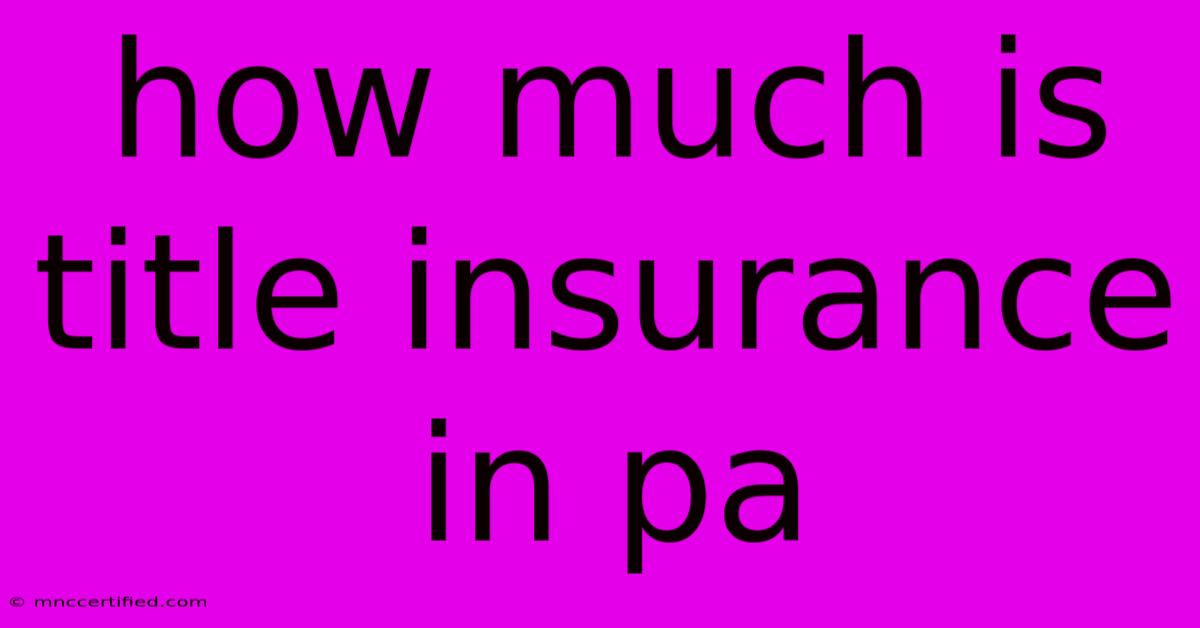How Much Is Title Insurance In Pa

Table of Contents
How Much is Title Insurance in Pennsylvania? A Comprehensive Guide
Buying a home in Pennsylvania is a significant investment, and understanding all the associated costs is crucial. One often-overlooked expense is title insurance. This article will delve into the cost of title insurance in PA, exploring the factors that influence the price and offering tips for navigating this important part of the home-buying process.
Understanding Pennsylvania Title Insurance
Title insurance protects homeowners and lenders against financial losses stemming from defects in a property's title. These defects can include things like:
- Forged deeds: A previous owner fraudulently transferred ownership.
- Unpaid taxes or liens: Outstanding debts attached to the property.
- Encroachments: Structures built on neighboring land.
- Boundary disputes: Uncertainty about the exact property lines.
In Pennsylvania, you typically purchase two types of title insurance:
- Owner's Title Insurance: Protects the buyer's ownership rights throughout their ownership of the property. This policy is usually a one-time payment.
- Lender's Title Insurance: Protects the lender (your mortgage company) against title defects. This is also usually a one-time payment, required by most lenders.
Factors Affecting the Cost of Title Insurance in PA
The cost of title insurance in Pennsylvania varies depending on several key factors:
1. The Property's Price:
This is the most significant factor. The higher the purchase price of the home, the higher the cost of title insurance. The premium is typically a percentage of the sale price, although the exact percentage can vary between title insurance companies.
2. The Type of Title Insurance:
As mentioned above, owner's and lender's title insurance are priced separately. Owner's title insurance premiums are typically higher than lender's title insurance premiums because they provide lifetime coverage.
3. The Complexity of the Title Search:
A thorough title search is essential to uncover any potential issues. If the title history is complex, with multiple owners or past legal issues, the search will take more time and effort, potentially increasing the overall cost.
4. The Title Insurance Company:
Different companies have different pricing structures. It's worthwhile to compare quotes from multiple title insurance companies before making a decision. Shop around!
5. Additional Services:
Some title companies offer additional services, such as escrow services or document preparation, which can add to the overall cost.
How Much Can You Expect to Pay?
There's no single answer to "how much is title insurance in PA?". The cost can range significantly, but generally:
- Lender's title insurance: Often ranges from 0.5% to 1% of the loan amount.
- Owner's title insurance: Typically ranges from 0.5% to 1% of the purchase price.
For example, on a $300,000 home with a $250,000 mortgage:
- Lender's title insurance could cost between $1,250 and $2,500 (0.5% to 1% of $250,000).
- Owner's title insurance could cost between $1,500 and $3,000 (0.5% to 1% of $300,000).
These are estimates; always obtain quotes from multiple title companies for your specific situation.
Tips for Saving Money on Pennsylvania Title Insurance
- Shop around: Get quotes from several title insurance companies to compare prices.
- Negotiate: Don't be afraid to negotiate the price, particularly if you're purchasing a home in a competitive market.
- Bundle services: If you're using the same company for other closing services, such as escrow, you might be able to negotiate a package deal.
Conclusion
Title insurance is a vital part of the home-buying process in Pennsylvania. While the cost can seem significant, it provides crucial protection against unforeseen title defects. By understanding the factors that influence the price and taking steps to shop around and compare quotes, you can ensure you're getting the best possible value for your money. Remember to factor this expense into your overall budget when planning your home purchase. Don't hesitate to ask questions and clarify any doubts with your real estate agent or closing attorney.

Thank you for visiting our website wich cover about How Much Is Title Insurance In Pa. We hope the information provided has been useful to you. Feel free to contact us if you have any questions or need further assistance. See you next time and dont miss to bookmark.
Featured Posts
-
Chiefs Host Blood Drive
Nov 19, 2024
-
Poland Vs Scotland Live Stream Free
Nov 19, 2024
-
Met Office Updates Nottinghamshire Weather Warning
Nov 19, 2024
-
Seaview Insurance Company Payment
Nov 19, 2024
-
Johnson Kendall Johnson Insurance
Nov 19, 2024